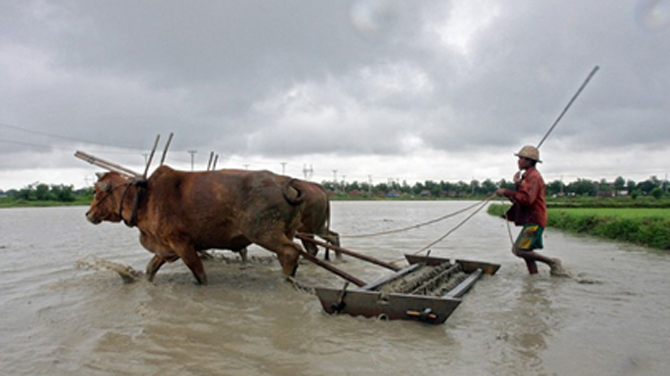Burma Farmers Fear Land Act

Pho Phyu had already been to jail twice. However, this did not deter the lawyer from joining with farmers in October in staging an unprecedented protest against a new draft Land Act that is currently awaiting approval—one of two cases pending against him for which he is on bail.
He carries, he says, the burden of 10,000 mouths on slight, yet confident shoulders, advocating as he does for 1,500 delta farmers who have had their land seized by big companies with connections to the government.
Pho Phyu estimates that since the new government took office in March last year some 10,000 acres of farmland have been seized in Rangoon and Irrawaddy divisions alone.
“Under the new law, millions of acres that have been seized by big companies will legally belong to them, and not the farmers,” says Pho Phyu.
Amid a tide of optimism, this is a dark area which some, such as Pho Phyu, believe is not only not progressing but could get worse. It covers the 70 percent of Burma's work force and their families who are small-scale farmers. A majority who will not be affected by the easing of Internet restrictions, or will probably never know that the BBC are now allowed to visit their country.
This as part of the government's reforms to change the economy to a market-orientated system, including the agriculture sector. Former government adviser and economist Khin Maung Nyo corroborates: “We need to change agriculture into a business.”
This impetus is driven by a new land act, which sources said is a subject of much debate that is now with being handled by the parliamentary bills committee.
Land ownership has been a grey area in Burma ever since the 1963 Land Act initiated under the then new government of Ne Win, which nationalized ownership of all land. The decline in the rule of law has made entitlement and propriety problematic ever since.
As a result most agree that the country needs a new Land Act, but new legislation seeks to push small farmers off their land and consolidate ownership among a few large corporations.
In addition, the 1963 legislation, according to Nick Cheeseman of the Asian Human Rights Commission (AHRC), “gave farmers cultivation rights. They could not be forcibly removed from land they were cultivating, or be removed from land because of debt.”
The new law has no much provisions say critics, allowing for absentee landlordism and the seizure of land for large scale non-agricultural uses.
According to a November statement of the AHRC, the new act, “is a law that has been written for the interests of powerful businessmen whose companies are already causing massive hardship and misery to people in various parts of Burma, and who are lining up to grab as much territory as possible.”
“They don't want the farmers and workers to be united,” said Pho Phyu. “The MPs have business interests. Most of the MPs are from the business or military groups, so in relation to such interests they make the law.”
Pho Phyu labels a number of companies who he alleges have seized farmers' land, among them Htoo Trading headed by flamboyant business tycoon Tay Za, who has been sanctions-listed because of his links to the previous military regime. Also named was Yuzana, one of the country's largest producers of the national dish, lapethoe (pickled tea leaves).
“The worst is MP U Aung Than Oo who owns Pin Le Khoo Twe,” says Pho Phyu of the Union Solidarity and Development Party MP for Thanlyn township in Rangoon.
The new land act necessitates that land dispute cases go to bodies under the Agricultural & Irrigation Ministry, under a process the AHRC says, “aggrandizes executive power.”
“Under the draft law's section 21, the Agriculture & Irrigation Ministry would have the power to alter or overturn any decisions taken in any one of the new land agencies,” the AHRC statement explains.
The new law, says Pho Phyu, is vague. For instance, terminology legitimizes seizures if they are viewed by the government as in the national interest, which, he says, enables land to be seized for non-agricultural purposes—on past record a policy that is deeply corrupt and cronyistic.
“We need to define exactly what they mean. Otherwise they can take whatever and whenever they like,” he adds.
Most agree that Burma cannot neglect the agricultural sector.
1 | 2 next page »
|
||
|
||
- Students Without a University
- Displaced and Distressed
- Training the Next Generation of Kachin Rebels
- Rangoon Art Show Provides Arresting Display
- Magical Mandalay Still Holds Court for Tourists
- Distrust and Displacement on Kachin Frontline
- Thein Sein: Reformist or Caretaker?
- School’s Not Out in Kachin State
- Irrawaddy Dolphins are Firm Fisherman’s Friends
- Thein Sein: Reformist or Caretaker?
